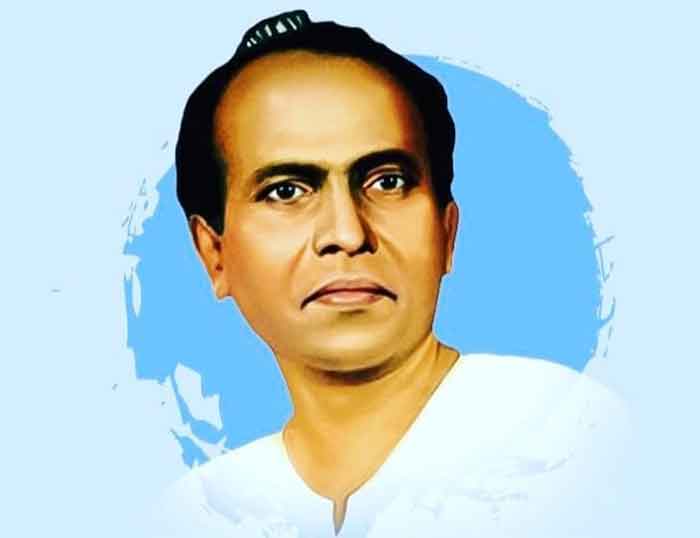
Annabhau Sathe, was an immensely admired dalit communist writer, performer who galvanised people’s struggles in Mumbai in the 1940s and 1950s.
Seeing a revival of his play on Mumbai’s working people’s struggles against capitalist domination, written in the 1950s, makes one realise that he in way preceded eminent urban radical thinkers like David Harvey and Henri Lefebvre who have emphasised the concept of people’s right to the city, shape its economy, space and so on. He wrote it against the background of the Samyukta Maharashtra struggle in the wake of the reorganisation of states on linguistic basis that took place after independence.
The city is the most suitable site for capitalist accumulation and exploitation of workers. Mumbai’s capitalists wanted to have the cake and eat it too, get all the benefits of the infrastructure and not share the surplus wealth generated by workers with the rural population. The upper class in the elite South Mumbai area look down even upon the better off sections in other parts of Mumbai. So one can imagine their indifference, hostility to the rural masses.
As Harvey has pointed out in the last couple of decades, revolutionary ideas spring from people’s struggles.
In the case of Sathe the idea came from the people’s struggle of the Samyukta Maharashtra struggle against the Congress’s decision in the 1950s to separate Mumbai from Maharashtra and administer it from the Centre.
The Samyukta Maharashtra movement has been somewhat misunderstood, it is seen by many merely as region based movement that grew during the days of the reorganisation of states in India soon after independence. For example On 1 October 1953, 11 districts in the Telugu-speaking portion of Madras State became the new Andhra State with Kurnool as the capital. And there were many such changes in different regions, some were strongly opposed by people.
In Maharashtra the struggle was also against capitalist domination. Perhaps nowhere was the working class so strongly involved in the struggle and the class element was very prominent with S.A. Dange, veteran communist leader, and other progressive leaders at the helm in Maharashtra.
Mumbai Konachi ? , the title of the play staged by IPTA, sounds like a chauvinistic slogan by the Shiv Sena. But it is far from it. In fact it is quite radical and raises important questions about people’s right to the city.
The first performance was staged by IPTA at a packed mini auditorium of Ravindra Natya Mandir on October 2, Gandhi Jayanti day. It got a rousing welcome from the audience. Real solidarity between the actors and audience and all for a good cause. All seats were taken, some seniors like Kuldeep Singh, noted music director, did not seem to mind sitting on the steps.
Also present were IPTA veterans, producer Masud Akhtar, Ramesh Talwar, Anjaan Srivasta. Sulabha Arya played the sootradhar, the chorus, making tongue in cheeks comments.The set is designed by veteran M.S. Sathyu.
The play was spectacular with a lot of humour.A large young and energetic cast did it in folk form with actors expressing so much with their bodies, adding so much to the written word.
It was directed by veteran Shivdas Ghodke with so much commitment, overcoming his illness, he has to use a stick to walk but is so enthusiastic.
It is serious theme, the conflict between capital and labour, the rich and the poor, but it was presented in such lively manner. No stereotypes. Even the exploiter Shetji, the businessman, was far from hackneyed. The performance began with Sathe’s famous lavani depicting the inequality of Mumbai from Malabar hill to the working class areas.
It is to the immense credit of Annabhau Sathe that he emphasised the importance of people’s right to the city so long ago.
This consciousness in him was created out of a mass upsurge , big demonstrations and morchas were taken out in Maharashtra in protest against the decision to separate Mumbai from Maharashtra. Police firing took a toll of 107 protesters from different walks of life, it is in their memory that we have Hutatma Chowk at Flora Fountain.
The Samyukta Maharashtra movement was in good measure for merger of some border areas into Maharashtra but it was also rooted in the struggle against economic injustice, domination of the city by vested interests.
There is now world wide recognition to people’s right to the city which is clear from so many charters and declarations including from UNESCO. There is recognition that ordinary people, workers contribute to the wealth of cities in big way. But the elite does not appreciate that. All signals suggest that there is plan to separate Mumbai from Maharashtra. Maharashtra governor Koshyari’s widely condemned statement is reflection of this anti-people bias. He had to apologise for this ill-judged observation that only certain communities created wealth , hinting that common people had no role in it. Annabhau Sathe showed how common people created wealth and infrastructure. Mumbai got its electricity at the expense of hundreds of peasants who lost their land for the Mulshi dam in the hinterland for a hydro electric project.
Annabhau’s vision was humanistic and universal. That is why he wrote a powada, a ballad, on the battle of Stalingrad against Hitler and the Spanish people’s struggle against fascism. It is in recognition of his contribution that his statue was recently installed in Moscow.
We owe a lot to people like him and ordinary people’s struggles for democracy and equality.
(Vidyadhar Date is senior journalist and culture critic.)

















































